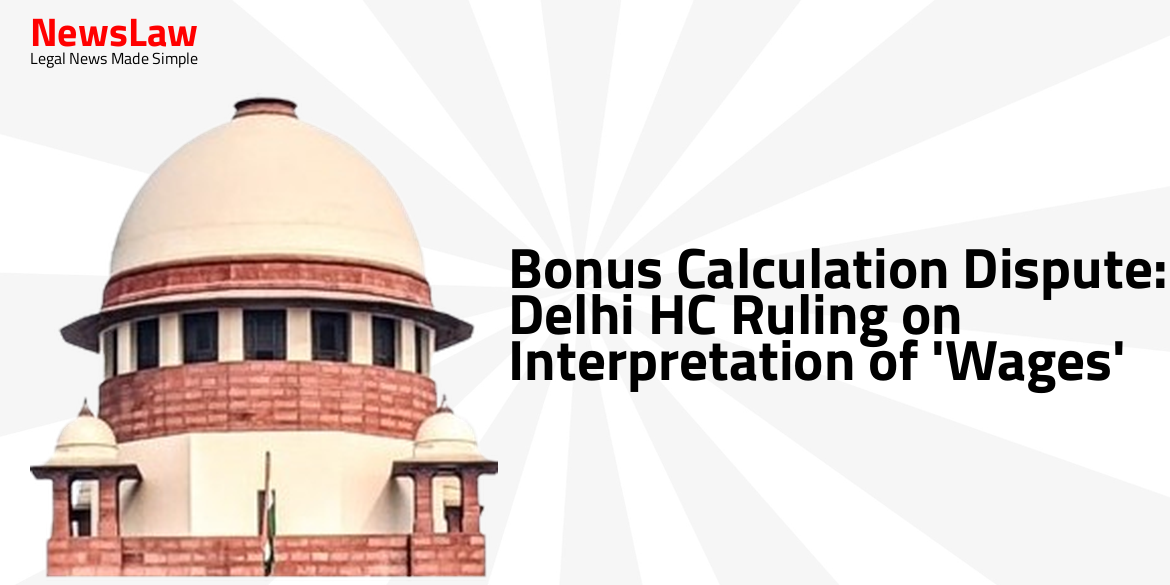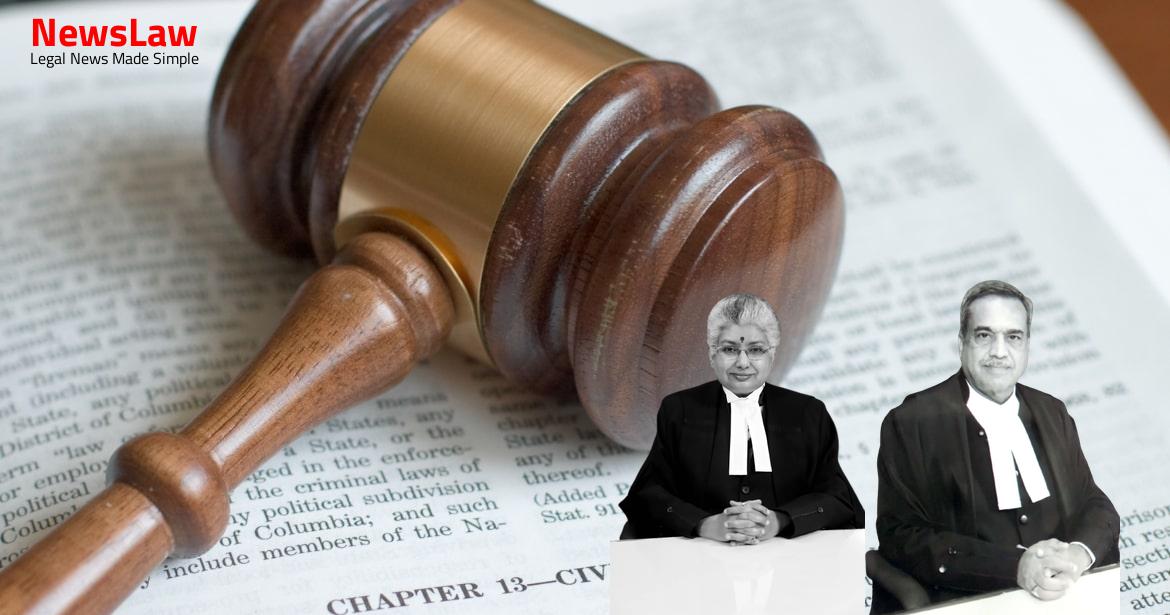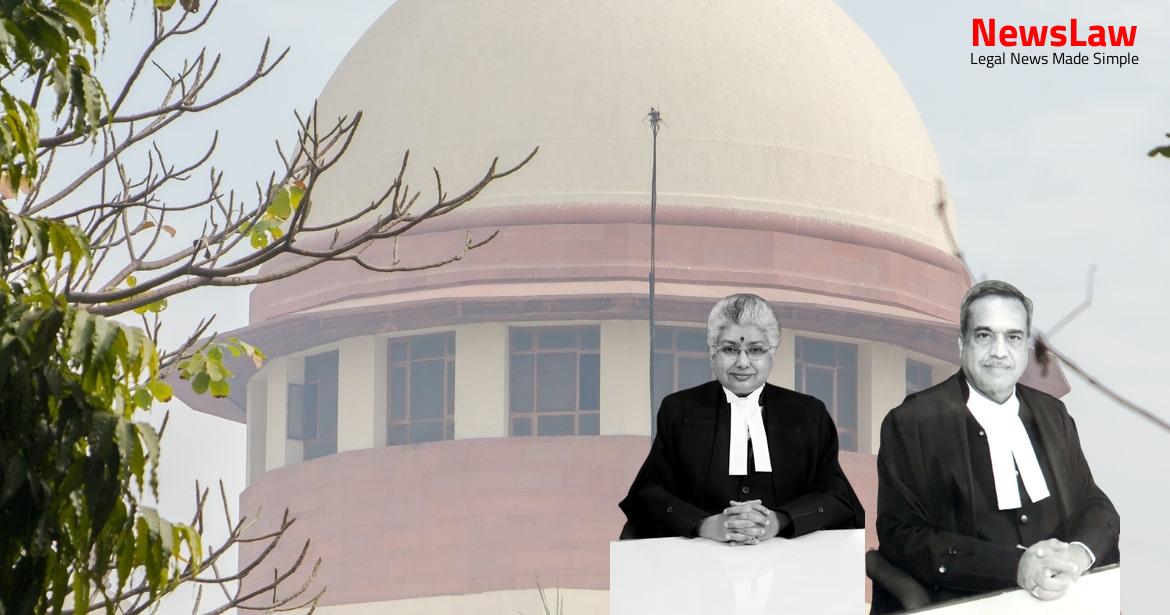In a recent legal case before the Delhi High Court, a dispute regarding bonus calculation was brought to light by the concerned parties. The court examined the interpretation of ‘wages’ under the Bonus Act, emphasizing the need for a precise understanding of the term. The ruling of the Delhi High Court in this matter brings clarity to the contentious issue between the parties involved. Stay tuned to learn more about how the court addressed the dispute and its implications for future cases.
Facts
- The respondent Union raised the issue of non-payment of bonus and filed a complaint before Government Authorities.
- After failed conciliation, the dispute was referred to the Industrial Tribunal for adjudication.
- A show cause notice was issued against the non-payment of bonus to the workmen.
- The petitioner entity sought quashing of the award dated 1 October, 2003, passed by the Court below.
- The petitioner argued that the definition of ‘salary or wages’ in Section 2(21) of the Bonus Act was exhaustive and should be strictly construed.
Arguments
- Petitioner argues that the Tribunal erred in applying the definition of wages from the Minimum Wages Act to the Bonus Act.
- Petitioner relies on the Supreme Court’s decision in Provident Fund Commr. v. G4S Security Services (India) Ltd. that courts cannot interpret a term defined in one act by referring to another act.
- Petitioner contends that the Bonus Act’s definition of ‘salary or wages’ in Section 2(21) is exhaustive and should be strictly interpreted for bonus calculation.
- Petitioner asserts that the Tribunal should have only considered Section 2(21) of the Bonus Act for bonus computation.
- Petitioner argues that the Tribunal violated natural justice by allowing new evidence without proper notice.
- Petitioner emphasizes that bonus calculation should strictly adhere to the Bonus Act provisions and should not be influenced by other legislation like the Minimum Wages Act.
- Petitioner claims that the legislative intent of the Bonus Act was to compute bonus based on the specific definition provided in the Act.
- Petitioner highlights that the Bonus Act’s provisions must prevail over other laws, such as the Minimum Wages Act, for bonus calculation.
- Petitioner points out that the Tribunal overlooked the exclusion of house rent allowance in the definition of ‘salary or wages’ under the Bonus Act.
- Petitioner concludes that the Tribunal’s decision, if upheld, would interfere with the legislative intent and principles of justice.
- The respondent contends that the petitioner entity incorrectly calculated bonus based on wages defined under the Minimum Wages Act, 1948.
- It is argued that the petitioner only paid bonus on basic pay, which goes against the intent of the Bonus Act.
- The respondent asserts that the petitioner follows the Minimum Wages Act for wage payments.
Analysis
- The Ld. Tribunal ignored the specific exemptions included in Section 2(21) of the Bonus Act regarding items not to be included in ‘salary or wages’.
- The Ld. Tribunal erred in interpreting the term ‘wages’ by referring to the Minimum Wages Act instead of the definition provided in the Bonus Act.
- The Ld. Tribunal disregarded the clear and self-contained definition of ‘salary or wages’ as outlined in Section 2(21) of the Bonus Act.
- The Ld. Tribunal overlooked previous judicial decisions that emphasized the importance of adhering to the precise language of a statute without adding or subtracting elements.
- The Ld. Tribunal’s decision resulted in adding words to the statute, which is impermissible and goes against the principle of statutory interpretation.
- The Ld. Tribunal failed to recognize that the intention of the Legislature is to be derived from the language used in the statute itself, and external evidence cannot be introduced to alter the plain meaning of the words.
- The decision of the Ld. Tribunal deviated from established principles of statutory interpretation and failed to give effect to the clear and unambiguous language of the law.
- The Ld. Tribunal’s interpretation introduced confusion by attempting to include components not specified in the statute, such as House Rent Allowance, which was deliberately omitted from the Bonus Act.
- Section 34 of the Bonus Act prevails over other laws in case of inconsistency
- The definition of ‘wages’ under the Minimum Wages Act differs from the Bonus Act
- Bonus calculation under the Bonus Act is not based on the Minimum Wages Act’s definition of ‘wages’
- Wages under the ID Act, Minimum Wages Act, and Payment of Bonus Act have distinct definitions
- The Payment of Bonus Act excludes allowances other than dearness allowance from wages
- Management argues that only dearness allowance should be considered as wages for bonus calculation
- Ruling states that allowances not directly related to employment may not be part of wages for bonus calculation
- The Supreme Court states that allowances are paid to make wages fair
- Employees are entitled to minimum wages as per the Minimum Wages Act
- Management’s argument to equate total wages with minimum wages for bonus calculation is contested
- Judgment distinguishes a case on the enforcement of agreements from bonus payment considerations
- Management’s approach of considering only basic salary for bonus payment while ensuring minimum wages is criticized
- The Learned Tribunal ignored that the concept of wages under the Minimum Wages Act is different from the definition of ‘salary or wages’ as defined in Section 2(21) of the Bonus Act.
- Applying all the basic principles of interpretation, the provision in Section 2(21) of the Bonus Act is self-contained and the meaning assigned to it by the tribunal is incorrect and against all principles of interpretation.
- The Award Proceeded on the erroneous assumption that the Legislature intended to provide bonus to employees covered under the Bonus Act as a percentage of the minimum wages payable to them, which is not supported by the plain language and intention of the Bonus Act.
- The Bonus Act is a self-contained code for calculating payment of bonus under its provisions and shall always prevail over other enactments regarding the definition and calculation of bonus payments.
- The management cleverly fragmented wages into different heads to escape the legal dues incurred in terms of bonus, paying only on the basic wage component and excluding other components like H.R.A., conveyance, and washing allowances.
- The terms of the reference for the dispute resolution did not convey a clear meaning regarding the payment of bonus and the dispute raised by the workmen was deemed an industrial dispute under the Industrial Dispute Act.
- While the reference was not precisely worded, both parties understood their cases and presented evidence accordingly, even though the recognized union did not have the proper authority to represent the workmen.
- The management’s objections against the reference terms and the union’s locus standi were dismissed by the tribunal as the reference pertained to bonus payments and the workmen’s demand for bonus on the entire wages was comprehended by both sides.
- The purposeful interpretation of the terms of the reference by the tribunal, based on the understanding of the parties, led to a just adjudication of the dispute related to the computation of bonus payments.
- The Court found that the petitioner presented substantial arguments highlighting the error in relying on the Minimum Wages Act’s definition of ‘wages’.
- It was noted that the petitioner is obligated to pay according to the Minimum Wages Act.
- The Court determined that the bonus computation should not be based on the Minimum Wages Act’s definition of ‘wages’.
- The term ‘wages’ has been defined under the Bonus Act.
- The court below interpreted the term in accordance with the explanation in the Minimum Wages Act, 1948.
- The Supreme Court held that courts should not look to other legislation to interpret the term differently.
- This practice can lead to inconsistent findings.
Decision
- Judgment uploaded on website immediately
- Citation mentioned in previous paras may be distinguished later
- Case heard on merits
- Contents of paras being replied to are denied as wrong
- Petition allowed and impugned award set aside
- Disputed remanded back to Labour Court for fresh adjudication
- Court directed to expedite the adjudication process
Case Title: GROUP 4 SECURITIES GUARDING LTD. Vs. SECY.LABOUR,GOVT.OF NCT OF DELHI (2024:DHC:4057)
Case Number: W.P.(C)-567/2004



